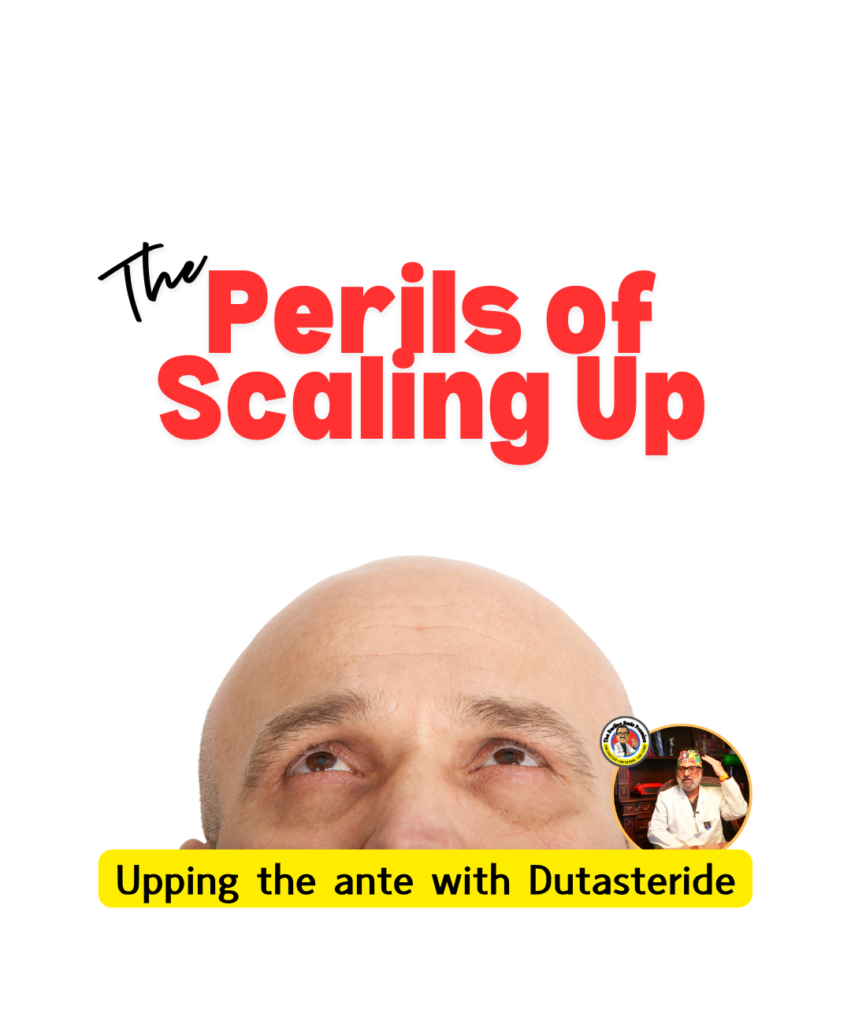The question about switching from Finasteride to Dutasteride is one I frequently encounter, especially from individuals who are either experiencing side effects on Finasteride or are hesitant because of the volume of negative stories they read online.
It is perfectly natural to feel apprehensive when considering medications that affect your hormonal balance, especially given the array of personal experiences and side effects that circulate online.
But the claim that those on Dutasteride have lesser side effects than those on Finasteride. This seems, counterintuitive given that Dutasteride is the stronger DHT blocker.
Also this reflects the nocebo effect of Finasteride since there is more negative press about it than any other drug for hair loss.
Let me tell you why?
Both Finasteride and Dutasteride are medications used in the treatment of androgenetic alopecia (male pattern baldness). They work by inhibiting the conversion of testosterone to dihydrotestosterone (DHT), the hormone implicated in shrinking hair follicles, leading to hair loss.
Finasteride inhibits about 67% of DHT by selectively blocking the enzyme 5-alpha reductase type II, which is one of the two forms of this enzyme.
Dutasteride, on the other hand, blocks both types I and II of the enzyme, inhibiting up to 90-95% of DHT production.
Due to Dutasteride’s stronger action, it is more potent in reducing DHT levels in the body and potentially has a more significant effect on hair loss, which is why some individuals might consider it a step up from Finasteride. However, Finasteride is FDA-approved for the treatment of hair loss, while Dutasteride, although used off-label for hair loss, is primarily approved for benign prostatic hyperplasia (BPH).
The variability in side effects between individuals is rooted in how each person’s body metabolizes the medication, the extent of hormonal changes they experience, and potentially the placebo or nocebo effect. Some people may experience fewer side effects on Dutasteride due to several reasons:
People metabolize drugs differently, and it is possible that some individuals metabolize Dutasteride more efficiently than Finasteride, leading to fewer systemic effects. However, this is more of an exception than a rule.
Perception and Expectations: There is a psychological component to drug side effects. If you were overly concerned about Finasteride due to the volume of negative stories online, this anxiety could manifest in a heightened sensitivity to side effects. When switching to Dutasteride, especially if you expect it to be better (perhaps because of anecdotal reports), the psychological burden may be lessened, thereby reducing the perception of side effects. This is known as the nocebo effect with Finasteride and the placebo effect with Dutasteride. I have already spoken of it here…
If you experienced side effects on Finasteride, it is prudent to approach Dutasteride with caution. Because Dutasteride suppresses even more DHT, it could potentially worsen or amplify the side effects you’ve already had.
While online reports and anecdotal experiences can create fear, it is crucial to base your decisions on evidence-based medicine and the judgement of an expert in the field. And there are many all over the world.
#hairloss #hairlosstreatment #hairlosstreatmentformen


